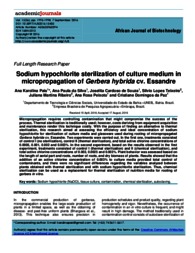Sodium hypochlorite sterilization of culture medium in micropropagation of Gerbera hybrida cv. Essandre.
Sodium hypochlorite sterilization of culture medium in micropropagation of Gerbera hybrida cv. Essandre.
Autoria: PAIS, A. K.; SILVA, A. P. da; SOUZA, J. C. de; TEIXEIRA, S. L.; RIBEIRO, J. M.; PEIXOTO, A. R.; PAZ, C. D. da
Resumo: Micropropagation requires controlling contamination that might compromise the success of the process. Thermal sterilization is traditionally used; however, costs deriving from equipment acquisition and maintenance render this technique costly. With the purpose of finding an alternative to thermal sterilization, this research aimed at assessing the efficiency and ideal concentration of sodium hypochlorite for sterilization of culture media and glassware used during rooting of micropropagated Gerbera hybrida cv. Essandre. Two experiments were carried out. In the first one, treatments consisted of control I (no sterilization), control II (thermal sterilization), and total active chlorine concentrations of 0.0005, 0.001, 0.002 and 0.003%. In the second experiment, based on the results observed in the first experiment, treatments consisted of control I (thermal sterilization) and II (chemical sterilization), and total active chlorine concentrations of 0.002, 0.0025 and 0.003%. Plant behavior was assessed based on the length of aerial part and roots, number of roots, and dry biomass of plants. Results showed that the addition of an active chlorine concentration of 0.003% to culture media provided total control of contaminants, and there were no significant differences regarding the variables analyzed between plants obtained with thermal sterilization and with sodium hypochlorite sterilization. Thus, chemical sterilization can be used as a replacement for thermal sterilization of nutrition media for rooting of gerbera in vitro.
Ano de publicação: 2016
Tipo de publicação: Artigo de periódico
Unidade: Embrapa Semiárido
Observações
1 - Por padrão são exibidas publicações dos últimos 20 anos. Para encontrar publicações mais antigas, configure o filtro ano de publicação, colocando o ano a partir do qual você deseja encontrar publicações. O filtro está na coluna da esquerda na busca acima.
2 - Para ler algumas publicações da Embrapa (apenas as que estão em formato ePub), é necessário ter, no celular ou computador, um desses softwares gratuitos. Sistemas Android: Google Play Livros; IOS: iBooks; Windows e Linux: software Calibre.
Acesse outras publicações
Acesse a Base de Dados da Pesquisa Agropecuária (BDPA) para consultar o acervo completo das bibliotecas da Embrapa.

